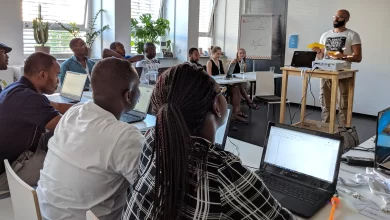Embracing Diversity: Navigating the Era of Foreign and Borderless Workers

In an interconnected world, the traditional boundaries of work are fading. The rise of foreign workers and borderless professionals is reshaping the global workforce landscape.
As businesses seek diverse talents and leverage advanced communication technologies, the concept of where and how work happens is undergoing a transformative shift. In this article, we delve into the implications, benefits, and challenges presented by this trend.
The Evolution of Work Boundaries:
Gone are the days when work was confined within the walls of a brick-and-mortar office. The advent of the internet, cloud computing, and advanced collaboration tools has paved the way for a new breed of professionals: the borderless workers. These individuals can contribute seamlessly from anywhere, transcending geographical borders.
The concept of work and its boundaries has undergone a profound transformation in recent years. The traditional notion of work being tied to a physical location, such as an office building, has given way to a more flexible and dynamic approach.
This evolution has been driven by technological advancements, changing attitudes towards work, and the need for businesses to adapt to a rapidly changing global landscape.
One of the key drivers of the evolution of work boundaries is the rise of remote work. With the advent of high-speed internet, cloud computing, and collaboration tools, professionals can now carry out their tasks from virtually anywhere with an internet connection.
This shift has enabled individuals to break free from the constraints of a physical office and has given rise to a new class of professionals known as digital nomads or borderless workers.
The proliferation of virtual collaboration tools has played a pivotal role in redefining work boundaries.
Video conferencing, instant messaging, project management software, and cloud-based document sharing have made it possible for teams to collaborate seamlessly even when they are geographically dispersed.
These tools have blurred the lines between in-person and virtual interactions, making remote work more viable and efficient.
Foreign Workers and Global Talent:
Globalization has amplified the movement of workers across borders. Foreign workers, often skilled and seeking better opportunities, contribute to the economic growth of host countries while enriching their own experiences. They bring diversity of thought, skills, and cultural perspectives that can foster innovation and global collaboration within organizations.
Benefits of Borderless Work:
- Diverse Perspectives: Borderless workers bring a rich tapestry of experiences and viewpoints, enhancing problem-solving and creativity within teams.
- Access to Specialized Skills: Businesses can tap into niche talents irrespective of geographical location, ensuring they have the right expertise for their projects.
- Flexibility and Work-Life Balance: Borderless work allows professionals to balance work with personal commitments and lifestyle choices, promoting overall well-being.
- Cost Savings: Businesses can cut overhead costs by utilizing remote talent and flexible work arrangements.
Challenges and Considerations:
- Cultural Dynamics: Embracing foreign workers requires organizations to navigate cultural nuances and create inclusive environments.
- Legal and Regulatory Factors: Compliance with immigration and employment laws is crucial when hiring foreign workers, which can be complex and time-consuming.
- Communication and Collaboration: Effective communication and team collaboration become critical in a virtual work environment to ensure seamless coordination.
- Security and Data Privacy: Protecting sensitive information while allowing remote access can pose cybersecurity challenges.
Strategies for Success:
- Diversity and Inclusion Initiatives: Organizations should foster an inclusive culture that embraces individuals from diverse backgrounds, ensuring they feel valued and heard.
- Robust Technology Infrastructure: Equipping remote workers with the right tools for communication, collaboration, and data security is essential.
- Adaptive Leadership: Managers must develop leadership skills that transcend physical presence, focusing on outcomes rather than micromanagement.
- Cross-Cultural Training: Providing cultural awareness training helps employees navigate differences and build strong, cohesive teams.
The Future of Work:
The rise of foreign and borderless workers is a testament to the evolving nature of work.
As technology continues to advance and globalization deepens. The traditional office setup is giving way to a more flexible, inclusive, and borderless work environment.
Embracing this trend requires a shift in mindset. An investment in technology, and a commitment to fostering a global community of professionals.
Conclusion: Foreign workers and borderless professionals are not just a trend but a reflection of the evolving nature of work in the 21st century.
Organizations that embrace diversity, leverage technology, and create inclusive environments stand to gain a competitive edge in the global marketplace. As the world becomes more interconnected, the workforce will continue to transcend borders, reshaping how we view work and collaborate across cultures.




